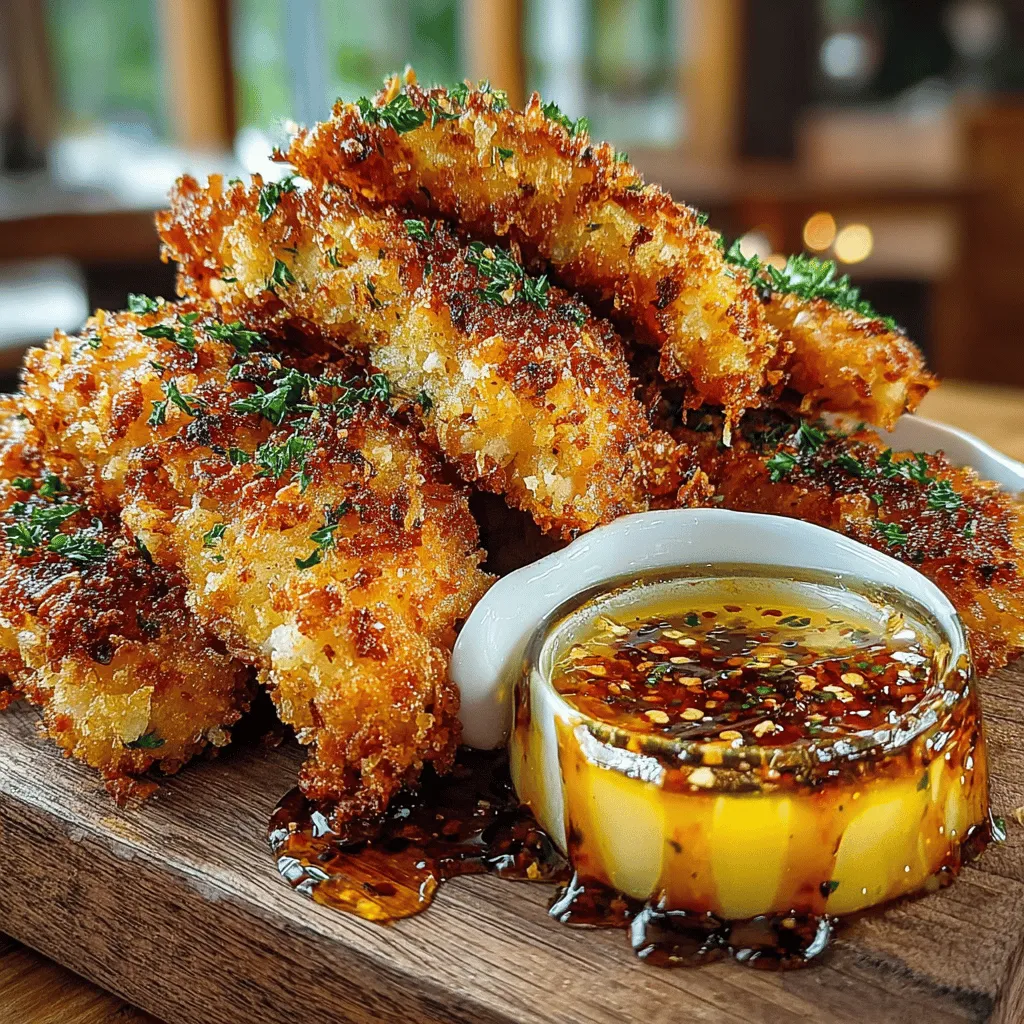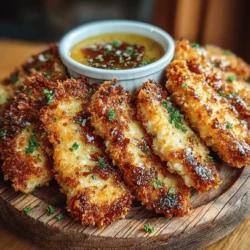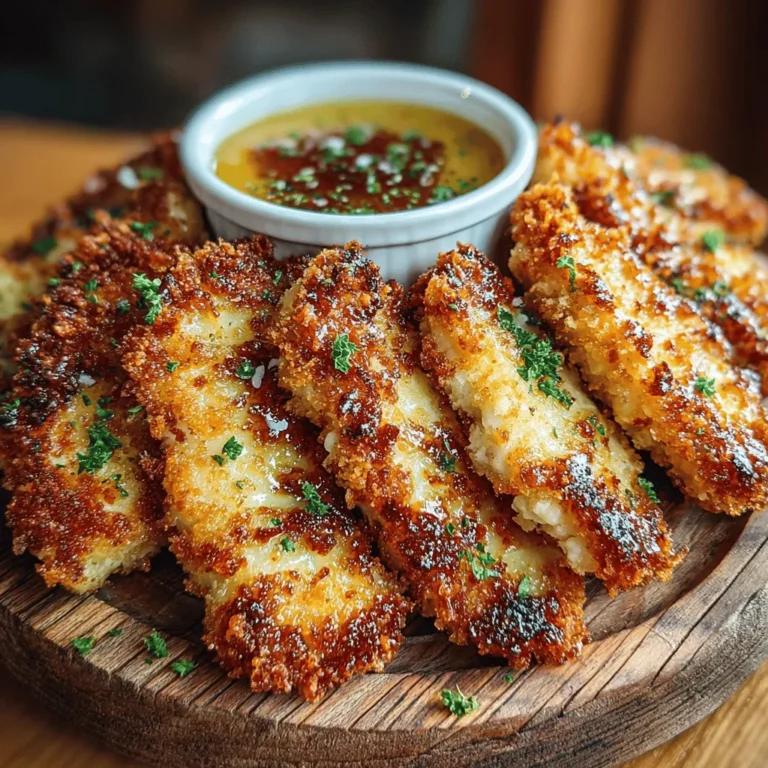Crispy Chicken Tenders with Honey Mustard Dip offer a delightful combination of flavorful, tender chicken and a sweet, tangy dipping sauce. This recipe is not only easy to prepare but also brings a taste of comfort food that appeals to both adults and children alike. Made with simple ingredients, this dish is perfect for weeknight dinners, casual gatherings, or as a tasty snack. In this article, we will walk you through the key steps of making these chicken tenders, sharing insights on ingredient choices, cooking techniques, and the perfect way to serve them.
Ingredients
– 1 pound boneless, skinless chicken breasts
– 1 cup buttermilk
– 1 cup all-purpose flour
– 1 cup panko breadcrumbs
– 1 teaspoon garlic powder
– 1 teaspoon onion powder
– 1 teaspoon paprika
– 1 teaspoon salt
– ½ teaspoon black pepper
– Oil for frying (vegetable or canola)
– ½ cup honey
– ¼ cup Dijon mustard
Instructions
1. Begin by slicing the chicken breasts into tender-sized strips, approximately 1-inch wide.
2. In a bowl, combine the chicken strips and buttermilk. Ensure all pieces are fully submerged. Cover and refrigerate for at least 1 hour or overnight for the best flavor.
3. In a separate bowl, mix the flour, garlic powder, onion powder, paprika, salt, and black pepper to create the seasoning mixture.
4. Place the panko breadcrumbs in another bowl.
5. Remove the marinated chicken from the refrigerator. Dredge each piece in the flour mixture, shaking off any excess.
6. Next, dip the floured chicken into the panko breadcrumbs, ensuring an even coating.
7. Heat oil in a deep frying pan over medium heat. You can test the oil’s readiness by dropping a small piece of bread into the oil; if it sizzles, the oil is ready.
8. Carefully place the coated chicken tenders in the hot oil, cooking in batches to avoid overcrowding. Fry until golden brown and cooked through, about 3-4 minutes per side.
9. Once cooked, transfer the chicken tenders to a plate lined with paper towels to drain excess oil.
10. For the honey mustard dip, whisk together honey and Dijon mustard in a small bowl until well combined.
Understanding the Key Ingredients
Exploring the Chicken Breast
Using boneless, skinless chicken breasts is ideal for making tenders as they are lean, easy to cut, and cook quickly. Choosing fresh chicken over frozen ensures better texture and flavor. If using frozen chicken, be sure to thaw it completely before marinating.
The Role of Buttermilk
Marinating chicken in buttermilk is key to achieving juicy, flavorful tenders. The acidity in buttermilk helps break down the chicken’s proteins, leading to a tender texture. If you don’t have buttermilk, you can create a substitute by mixing milk with a little vinegar or lemon juice.
Decoding the Breading Mixture
The breading is crucial for achieving that perfect crispy exterior. Combining all-purpose flour with seasonings creates a flavorful base, while panko breadcrumbs provide extra crunch. Unlike regular breadcrumbs, panko is lighter and flakier, which contributes to a more appealing texture.
The Honey Mustard Dip: A Perfect Pairing
The honey mustard dip complements the tenders beautifully with its sweet and tangy profile. The combination of honey and Dijon mustard can be adjusted according to taste—add more honey for sweetness or more mustard for a spicier kick.
Step-by-Step Guide to Making Crispy Chicken Tenders
Marinating the Chicken: The Foundation of Flavor
Proper marinating is essential for flavor absorption and moisture retention. Aim for at least an hour in the fridge, but overnight is recommended for maximum flavor. Always marinate in a covered container to prevent contamination.
Setting Up Your Breading Station
To streamline the breading process, organize your workspace with three bowls—one for the buttermilk, one for the flour mixture, and one for the panko breadcrumbs. This setup not only makes the process efficient but also helps keep your hands clean.
Breading Techniques for Perfectly Coated Tenders
When breading, ensure that each piece is evenly coated without clumps. It’s important to shake off excess flour before dipping into the panko to achieve an even crust. Avoid the common mistake of pressing too hard on the breadcrumbs, as this can lead to a dense coating instead of a light, crispy texture.

Frying: Achieving the Perfect Crisp
Ideal Oil Temperature and Why It Matters
To achieve that golden-brown, crispy exterior on your chicken tenders, it’s essential to fry them at the right temperature. The ideal oil temperature for frying chicken is between 350°F to 375°F (175°C to 190°C). If the oil is too cool, the chicken will absorb more oil, resulting in a greasy texture rather than a crisp one. Conversely, if the oil is too hot, the outside may burn before the inside cooks thoroughly. Use a deep-fry thermometer for accuracy, and allow the oil to return to the proper temperature between batches.
Techniques to Prevent Overcrowding and Ensure Even Cooking
One of the most common mistakes in frying is overcrowding the pan. When too many tenders are added at once, the oil temperature drops, leading to uneven cooking and less crispy results. Fry the chicken in small batches, giving each piece enough space to cook evenly. This ensures that hot oil circulates around each tender, promoting that perfect crunch.
Draining and Keeping the Chicken Warm
Best Practices for Draining Excess Oil
After frying, it’s crucial to remove excess oil to maintain the crispy texture. Use a slotted spoon or tongs to transfer the chicken tenders to a wire rack set over a baking sheet. This allows the oil to drain off while preventing steam from making the tenders soggy. Avoid placing them directly on paper towels, as the steam will get trapped and soften the coating.
Tips on Keeping Chicken Tenders Warm Without Drying Them Out
If you’re preparing multiple batches, keep the cooked chicken tenders warm by placing them in a preheated oven set to 200°F (93°C). Arrange them in a single layer on a wire rack in a baking sheet to avoid trapping moisture. This method keeps them warm without compromising their crispiness, ensuring they stay delicious until serving.
Crafting the Honey Mustard Dip
Mixing the Perfect Balance of Flavors
For the honey mustard dip, combine equal parts of honey and mustard for a classic base. Start with 1/4 cup of each, and mix thoroughly in a small bowl. Adjust the flavors to your liking by adding a splash of apple cider vinegar for tang or a pinch of cayenne pepper for heat. Whisk until smooth, and taste as you go to achieve your desired balance.
Variations for Different Flavor Profiles
Feel free to experiment with different ingredients to customize your dip. Adding finely chopped fresh herbs like dill or parsley can bring a refreshing taste, while a bit of garlic powder can enhance the flavor depth. For a sweeter twist, incorporate a dash of maple syrup or brown sugar. These variations allow you to tailor the dip to suit your palate or to complement various occasions.
Serving Suggestions for Crispy Chicken Tenders
Presentation Ideas
The presentation of your chicken tenders can elevate the dining experience. Arrange the tenders neatly on a large platter or individual plates, and consider serving them in a cone made from parchment paper for a fun, casual touch. Add a small bowl of honey mustard dip in the center or alongside for easy access. Garnish with fresh herbs or slices of lemon to add color and vibrancy to the dish.
Pairing Options for a Complete Meal
For a well-rounded meal, consider pairing your chicken tenders with classic sides like coleslaw or crispy fries. Fresh vegetables, such as a garden salad or roasted broccoli, can provide a nutritious balance. Additionally, for beverage pairings, a cold craft beer or a refreshing iced tea can complement the flavors beautifully, while a light white wine offers a sophisticated touch.
Nutritional Information and Health Considerations
Caloric Breakdown of the Dish
When enjoyed in moderation, crispy chicken tenders can fit into a balanced diet. Each serving typically contains around 300-400 calories, depending on portion size and cooking method. To make them healthier, consider baking or air frying instead of deep frying, which reduces the oil content significantly.
Understanding Dietary Preferences
For those with dietary restrictions, there are numerous ways to adapt this recipe. To make the tenders gluten-free, substitute regular breadcrumbs with gluten-free panko or crushed cornflakes. For dairy-free modifications, ensure that the mustard and any additional ingredients do not contain dairy. These adjustments allow everyone to enjoy this delicious dish without compromising their dietary needs.
Conclusion
Crispy Chicken Tenders with Honey Mustard Dip are a versatile and crowd-pleasing dish that can be enjoyed in various settings. From family dinners to parties, this recipe provides a deliciously satisfying meal that is sure to be a hit. By following the outlined steps and understanding the importance of each ingredient, you can create a dish that not only tastes great but also brings joy to your table. Whether you choose to stick with the classic recipe or experiment with different dips and sides, the possibilities for enjoyment are endless.

